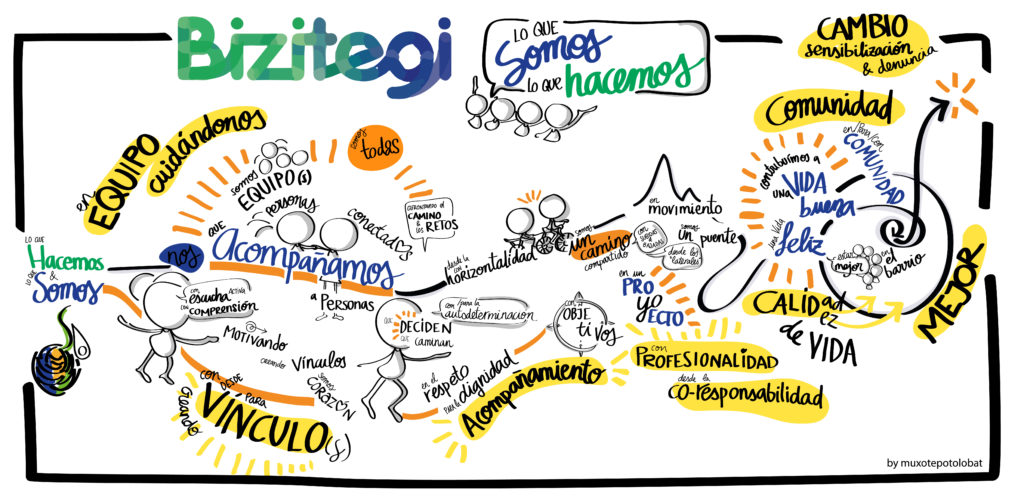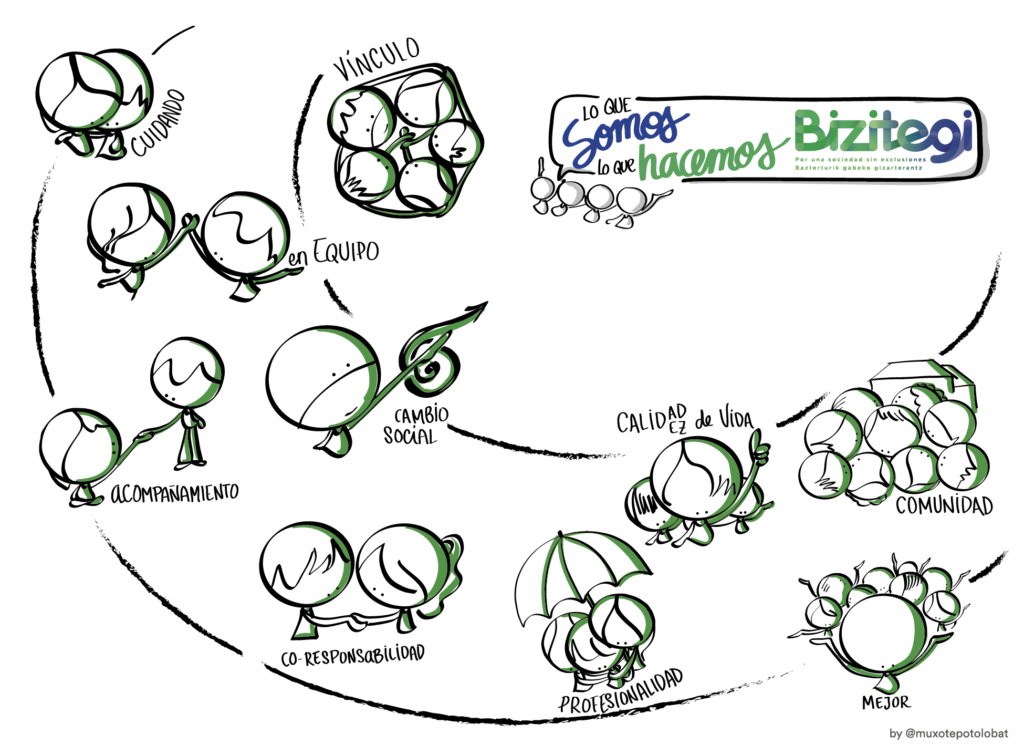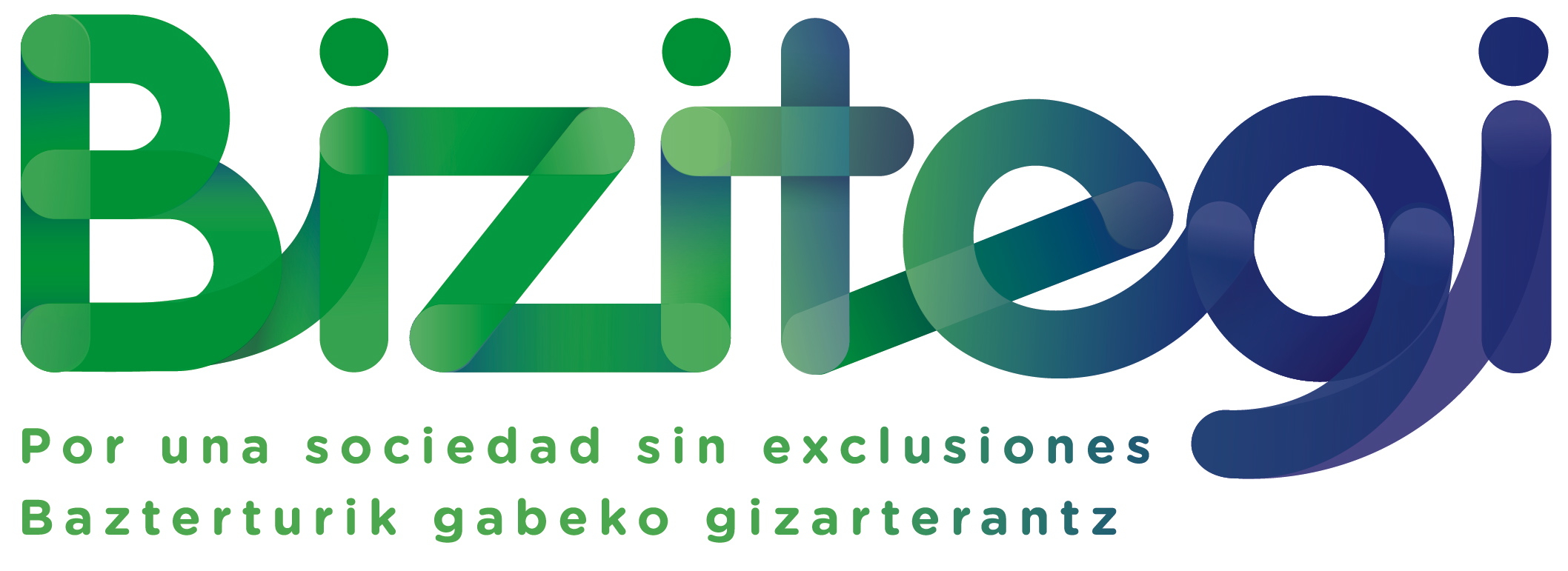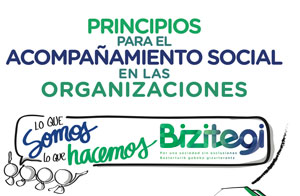
The objective of our support model is to facilitate processes of social integration to afford people a greater degree of autonomy and a better quality of life.
The services we offer people have to be adapted to their individual characteristics and situation. As a guide, we use a General Customised Plan as a framework on which to base all our support for each individual. This plan, in conjunction with the Basque Government’s Common Technical Instrument for the Evaluation and Diagnosis of Social Exclusion, focuses on the following life-related areas:
We developed our support model based on a collective process of reflection. It is a story where, both verbally and visually, we set out the 10 principles. We use a series of statements to explain each principal that in turn makes up our value system. It needs to be understood simultaneously by your mind, feelings and emotions.
We are individuals who accompany individuals
through processes of mutual bonds,
where we care for others and let others care for us.
We work as a team
with professionalism and
warmth, from the heart.
It’s a journey of mutual accompaniment,
undertaken with an attitude of shared responsibility.
Always influx, centred on improving,
to foster noble life projects,
freely chosenby each individual.
We are part of a community
and we work to ensure it becomes
more inclusive.
Teamwork: Based on mutual respect, acknowledgment and emotional support. Honesty, active listening, differences, well-being and support for each decision taken are each very important.
Care: Caring for others and yourself with the support of the team, generating a good work environment and healthy, loving relationships based on listening and flexibility.
Connections: Respect for other people’s values based on mutual interactions. It includes support, mutual trust, communication and emotional connection. This is influenced by the role each individual plays within the organisation and the maintenance of distancesappropriate to each situation.
Support: Place yourself beside the other person. This is a temporary, dynamic and free relationship, where both parties give and receive from a place of acceptance, listening and respect for the other person’s values and pace.
Professionalism: Listening, emotional connection, open to change and in a spirit of dialogue. It is part of team environment within an organisation and regulated by a professional relationship.
Co-responsibility: Everyone contributes to the common good and respects everyone’s roles. Taking individual decisions based on a shared set of criteria that makes up the organisational culture. Set reachable objectives, assess means accordingly, take responsibility for one’s actions and get involved from a place of mutual recognition.
Social change: Values include dignity, diversity, equal opportunity and cooperation. It involves undertaking advocacy and awareness-generating campaigns; preparing constructive and feasible proposals for action; and using these values to guide our day-to-day.
Community: It provides a sense of belonging, identify and recognition. The neighbourhood is the best example of a community environment. Actively participating in one’s community requires effort and impacts people and society.
Quality of life: A happy life means undertaking an important life project which is based on our values and life expectations. It requires minimum levels of material wellbeing and a satisfactory emotional and relational world.
Better: It reflects an attitude of movement and search from one’s own identity when meeting others.

Financial/work status, housing:
- Availability, stability and amount of income. Accommodation and housing expenses, cost of goods, and basic and non-basic services.
- Employment and occupational status of individuals.
- Rights and benefits the individuals have access to.
Cohabitation:
- Housing situation of the person.
- Bonds of affection, relationships and social support received from people and groups in the area.
- Establishing routines to cover basic needs.
Personal:
- Social, cognitive and instrumental competencies.
- Level of education, information and training.
- Level of energy behind the dynamic of existence.
- Sense of reality, motivation for change and the use of social protection
Health and social-health services:
- The health situation of the individual (physical and mental health, drug use), and of any actions aimed at improving or stabilising it: healthcare and treatment.
- Level of disability or dependence of individuals and recognition of their related rights.
Social:
- Level of adaptation and integration of individuals in existing community life.
- Degree to which the human need for social relationships and a social life is satisfied through the performance of activities related to the development of social relationships and a social life.
Through our network of services we provide individual and group services that we believe support this objective. We classify these activities into different types:
- Rights and obligations: Informing, guiding and giving advice in relation to social rights. Also, encouraging and facilitating access to them.
- Pre-employment: Favouring the acquisition of pre-employment habits (punctuality, perseverance, interest in learning, motivation, using tools, responsibility, etc.), which will be useful to them for gaining and maintaining a work placement.
- Training and/or employment advice: Guidance and support to provide them with the tools they need to join the labour force.
- Reference activities: Individual support aimed at implementing and maintaining advances in all areas of a person’s life, thereby improving the quality of it.
- Conection activities: Encouraging acceptance, integration and a sense of belonging to care mechanisms, favouring connection to them.
- Assemblies: These provide a common platform for expression that helps individuals with their personal processes via the contributions of equals.
- Leisure activities: These provide fulfilling, healthy experiences that foster autonomy.
- Technical and instrumenal activities: These help users become job-ready by participating in manual activities that teach them good habits and develop their skills.
- Training activities: These foster the development of an individual’s capabilities and skills through classroom-based and practical activities.
- Social, cognitive and instrumental competencies: These foster the development of an individual’s capabilities and skills via participation in gratifying and enriching tasks carried out within a group context.
- Health-related activities: These activities are designed to help with both physical and mental wellbeing.
- Awareness campaingns anda actions of social criticism: These contribute to the social transformation of the environments we work in, boosting and strengthening our presence in the community as an organisation putting into practice its mission, vision and values.
- Comunity work: .This boosts and strengthens our active presence in the community. It covers different levels of community participation from using community resources to providing services for individuals and collectives in the local area.

